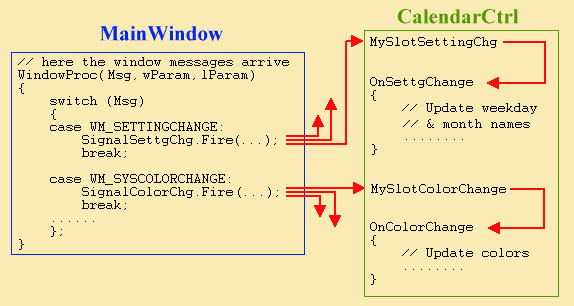Qt Signal Slot Same Class
Support for signals and slots pyqt 5.10.1 reference guide support for signals and slots one of the key features of qt is its use of signals and slots to.

Qt Signal Slot Thread
Quite a frequent problem when working with signals with slots in Qt5, according to my observations on the forum, is the connection of slots in the syntax on the pointers to signals having an overload of the signature. The same applies to slots that have an overload.
Let's take a test class that has overloaded signals.
Here there is a signal, with an overload of the signature. Connect this signal will also be to the slots that are declared in the Widget class, and which also have an overload of the signature.
How it was in Qt4
Within Qt4, everything was solved quite simply by specifying the signature of the signal and the slot in the SIGNAL and SLOT macros.
How it became in Qt5
- One of the features which I have been working on is a new syntax for signals and slot. This blog entry will present it. The type names of the slot must match exactly the ones of the signal. And they also need to be the same in the header and in the connect statement. The slot was just declared as public and not as slot.
- A signal (specifically an unbound signal) is an attribute of a class that is a sub-class of QObject. When a signal is referenced as an attribute of an instance of the class then PyQt4 automatically binds the instance to the signal in order to create a bound signal. This is the same mechanism that Python.
But in Qt5, when writing in the new syntax of signals and slots, there are some problems. Because you need to make the static_cast of the method signature.
By the way, the new syntax also allows you to connect signals to slots with a smaller signature, as it was in Qt4.
Advantages of the new syntax
And now a stumbling block. Why use the new syntax of signals and slots? I still hear this question from time to time. Especially when people see such terrible castes of signatures.
Qt Signal Slot Same Classifieds
- Therefore, I will list potential advantages:The ability to track errors in the connection of signals and slots at the compilation stage, rather than in the runtime
- Reducing compilation time by excluding macros from the code
- The ability to connect lambda functions, it's quite an important bun
- We protect ourselves from errors when we try to connect from the outside to a private slot. Yes!! Yes!! The SIGNAL and SLOT macros ignore the access levels of methods, violating OOP.
Qt Signal Slot Not Working
In general, for me this is enough, but for you?



